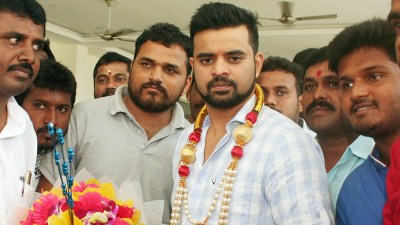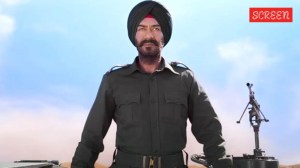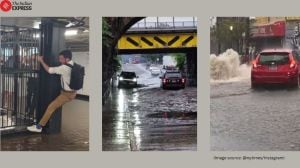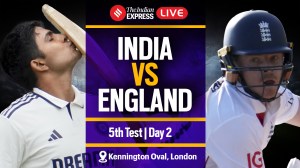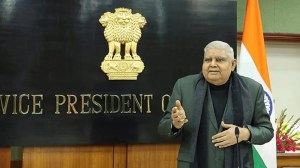‘What textbooks should we buy… when will classes begin?’: Students, teachers at Delhi’s specialised schools ‘stranded’ after shift to CBSE
The move, announced by the Directorate of Education (DoE) on Tuesday, has triggered confusion among students of SOSEs — first set up under DBSE in 2021 — their teachers, as well as parents.
 Education Minister and BJP leader Ashish Sood had earlier said that all “positive aspects” of Delhi’s education system would be retained, and that “innovative, new ones” would be introduced.
Education Minister and BJP leader Ashish Sood had earlier said that all “positive aspects” of Delhi’s education system would be retained, and that “innovative, new ones” would be introduced. Starting this academic session, the Delhi government’s Schools of Specialised Excellence (SOSEs), which teach students from classes 9 to 12, will have students of different classes follow different boards – while Class 9 students will study Central Board of Secondary Education (CBSE) curriculum, the others will continue to follow the Delhi Board of Secondary Education (DBSE).
The move, announced by the Directorate of Education (DoE) on Tuesday, has triggered confusion among students of SOSEs — first set up under DBSE in 2021 — their teachers, as well as parents.
“’What textbooks should we buy, when will classes begin… these are some questions that anxious students, who are to take admission in SOSEs, are asking,” said an SOSE teacher.
The teacher added that confusion prevailed among the faculty members as well. “Will DBSE continue for classes 10, 11 and 12? We do not have any clarity.”
According to the circular issued by DoE, the aptitude test for admission to class IX will be held shortly, and successful candidates “will be enrolled under CBSE…”. Further guidelines for the admission process are expected to follow. The circular did not mention anything about the rest of the classes, forcing teachers to continue students under the DBSE.
A senior official in the Education department said, “Detailed directions will be released soon for admission to Class 9. For the rest, classes 10 to 12, guidelines will be issued time to time… these classes will as of now continue under DBSE…”
“At present, one of the main concerns of the parents has been answered, as we have said that Class 9 students will be enrolled under CBSE,” the official added.
The timing of the decision, however, has raised concerns around academic planning, classroom preparedness, and clarity on curriculum.
The SOSEs were launched in 2021 by the AAP government to offer specialised and skills-based education under DBSE to students of classes 9, 10, 11 and 12.
This year, admission to SOSEs, which is completed by mid-April, is still continuing. The CBSE schools, however, have already commenced their new academic session at the beginning of April.
According to the teacher, they have been informally integrating CBSE components into DBSE classes, especially for CUET preparation, but this has led to a “pedagogical mismatch”.
“The staffers are attempting to bridge the gap by including CBSE content within DBSE lessons but the uncertainty is disruptive… We are teaching the content of both DBSE and CBSE,” said the head of one SOSE.
Teachers point out that the pedagogy for CBSE and DBSE is vastly different. Under DBSE, teachers function more as facilitators in a student-led learning environment, whereas CBSE follows a more traditional instructional approach. The shift is forcing educators to straddle two worlds.
A government school teacher who taught in SOSEs in the inaugural year, recalled, “This is similar to 2021… I taught both sets of students, and teachers struggled because there was a lot of hard work and preparation needed, especially for DBSE. Students who joined from private schools might now be questioning their decision. If DBSE is being phased out, what has changed for them? This has impacted them the most.”
Some parents are reportedly demanding a return to the RPVV (Rajkiya Pratibha Vikas Vidyalaya) model, which the SOSEs had replaced. Unlike RPVVs, which admitted only students from government schools, SOSEs allow any student from a recognised school to apply, although 50% of the seats are reserved for students from government or aided schools.
Delhi had started with 20 SOSEs in 2020-21, the number has now grown to 37.
The AAP, meanwhile, accused the BJP government of taking a regressive step driven by political vendetta. “This is a politically motivated step because the BJP government has not given any academic justification of why it is opposed to DBSE,” the party told The Indian Express.
“In its hatred towards the previous Kejriwal government, they do not mind playing with the future of nearly 12,000 students currently enrolled in DBSE-affiliated schools… This is a myopic and regressive decision.”
The DBSE, AAP argued, was developed to align with the National Education Policy 2020 and reduce the dropout rate by offering an alternative to the expensive CBSE framework.
Education Minister and BJP leader Ashish Sood had earlier said that all “positive aspects” of Delhi’s education system would be retained, and that “innovative, new ones” would be introduced. However, there has been no formal explanation offered for why DBSE might be phased out.


